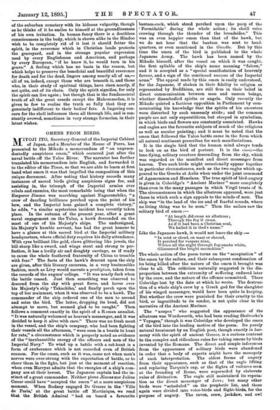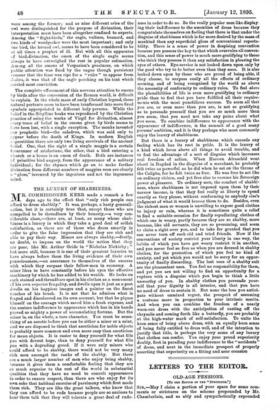OMENS FROM BIRDS.
MIYOJI ITO, Secretary-General of the Imperial Cabinet of Japan, and a Member of the House of Peers, has presented to the Mikado a memorandum of "an unprece- dentedly auspicious omen," which occurred just after the naval battle off the Yaloo River. The narrator has further translated his memorandum into English, and forwarded it to the editor of the Times, so that we are able to learn at first hand what omen it was that impelled the composition of this unique document. After noting that history records many instances of sacred birds giving auspicious signs for, and assisting in, the triumph of the Iraperial armies over rebels and enemies, the most remarkable being that when the Emperor Jimmu was marching against Nagasunehiko, "a crow of dazzling brilliance perched upon the point of his bow, and the Imperial host gained a complete victory," he adds, "a similar mysterious incident has recently taken place. In the autumn of the present year, after a great naval engagement on the Yaloo, a hawk descended on the mast of one of his Majesty's ships. The undersigned, his Majesty's humble servant, has had the great honour to have a glance at this sacred bird at the Imperial military headquarters, where official duty requires his daily attendance. With eyes brilliant like gold, claws glittering like jewels, the bill sharp like a sword, and wings stout and strong to per- fection, it has a lordly air and doughty carriage, as if ready to cause the whole feathered fraternity of China to tremble with fear." The facts of the hawk's descent upon the ship are given, after this literary excursus, in a very businesslike fashion, much as Livy would narrate a prodigium, taken from the records of the augurs' college. "It was nearly dark when the battle ceased. Just then something was observed to descend from the sky with great force, and hover over his Majesty's ship Taka,chiho,' and finally perch upon the top of her mainmast, when it was observed to be a hawk. The commander of the ship ordered one of the men to ascend and seize the bird. The latter, dropping its head, did not attempt to move, but seemed glad to be caught." Then follows a comment exactly in the spirit of a Roman annalist. "It was naturally welcomed as heaven's messenger, and it was decided to keep it alive with care." There was no fresh meat in the vessel, and the ship's company, who had been fighting their vessels all the afternoon, "were soon in a bustle to hunt for rats," a circumstance which is properly noted as evidence of the "inexhaustible energy of the officers and men of the Imperial Navy." To wind up a battle with a rat-hunt is a form of exuberance which is not recorded even of British seamen. For the omen, such as it was, came not when men's nerves were over-strung with the expectation of battle, or to cheer them in the fight, but just at the moment of reaction, when even llarryat admits that the energies of a ship's com- pany are at their lowest. The Japanese captain had the in- stinct of a great commander. Neither pious ..Eneas nor Julius Cmsar could have "accepted the omen" at a more auspicious moment. When Rodney engaged De Grasse in the Ville de Paris,' at the great battle off Martinique, we read that the British Admiral "had on board a favourite
bantam-cock, which stood perched upon the poop of the Formidable' during the whole action ; its shrill voice crowing through the thunder of the broadsides." This was an even happier omen than that of the hawk, but we do not bear that the bantam was sent to head- quarters, or even mentioned in the Gazette. But by this time the omen of the bird is published to the whole Japanese Army. The hawk has been named by the Mikado himself, after the vessel on which it was caught, the first syllable of the ship's name meaning "falcon," and it is accepted as a "special manifestation of heavenly favour, and a sign of the continued success of the Imperial arms." The appeal made by this omen is easily understood, for the Japanese, if shaken in their fidelity to religion as represented by Buddhism, are still firm in their belief in direct communication between man and unseen beings, whether disembodied spirits or angels. Only recently the Mikado quieted a factious opposition in Parliament by com- municating his knowledge that the spirits of his ancestors were disturbed by such unseemly strife ; and the common people are not only superstitious, but steeped in symbolism, in which birds and flowers are constantly associated. Hawks and eagles are the favourite subjects of much of the religious as well as secular painting; and it must be noted that the omen that followed the Yaloo battle came in the form which all natural sentiment prescribes for such manifestations.
It is the single bird that the human mind always tends
to look on as the bird of portent. It is the oirdy4---the lone-flying, solitary creature descending from the sky, which
was regarded as the manifest and direct messenger from heaven. Two such birds might occasionally appear together in particular circumstances, such as the two eagles which ap- peared to the Greeks at Aulis when under the joint command of Agamemnon and Menelaus. The true spirit of bird-augury is given in Coleridge's "Ancient Mariner" more completely than even in the many passages in which Virgil treats of it. The circumstances in which the albatross appeared, were just those in which such a sign appeals to the minds of men. The ship was "in the land of the ice and of fearful sounds, where no living thing was to be seen." Then the sailors saw the solitary bird of omen
"At length did cross an albatross ; Through the fog it came.
As if it had been a Christian soul, We hailed it in God's name."
Like the Japanese hawk, it would not leave the ship " In mist or cloud, on mast or shroud,
It perched for vespers nine, Whiles all the night through fog-smoke white, Glimmered the bright moonshine."
The whole action of the poem turns on the "acceptation" of the omen by the sailors, and their subsequent condonation of its being killed after the nature of the omen it brought was clear to all. The criticism naturally suggested is the dis- proportion between the extremity of suffering endured later by the crew, and the nature of the offence committed. There Coleridge lost by the date at which he wrote. The destruc- tion of a whole ship's crew by a Greek god for the slaughter of his winged messenger, would have been quite in keeping.
But whether the crew were punished for their cruelty to the bird, or ingratitude to its sender, is not quite clear in the narrative of the Ancient Mariner.
The " auspex " who suggested the appearance of the albatross was Wordsworth, who had been reading Shelvocke's "Voyages," though it was Coleridge who developed the omen of the bird into the leading motive of the poem. Its purely
natural treatment by an English poet, though exactly in har- mony with the spirit of ancient Greece, is a curious contrast
to the complex and ridiculous rules for taking omens by birds invented by the Romans. The direct and simple inferences
from the appearance of solitary birds were abandoned in order that a body of experts might have the monopoly of such interpretation. The oldest forms of augury from their appearance, such as that of the eagle lifting and replacing Tarquin's cap, or the flights of vultures seen at the founding of Rome, were superseded by elaborate rules of divination. The eagle still maintained its reputa- tion as the direct messenger of Jove ; but many other birds were "scheduled" on the prophetic list, and these again were divided into voice-birds and flight-birds, for the
purpose of augury. The raven, crow, jackdaw, and owl
were among the former; and as nine different cries of the owl were distinguished for the purpose of divination, their interpretation must have been altogether confined to experts. Among the "flight-birds," the eagle, vulture, buzzard, and two kinds of woodpecker were the most important ; and only one bird, the horned owl, seems to have been considered to be at all times a prophet of ill. But with all this apparatus of bird-divination, the omen of the single eagle seems always to have outweighed the rest in popular estimation. Among all the omens of Vespasian's greatness, on which public attention was fixed by the vague though persistent u mour that the time was ripe for a " ruler " to appear from jadtca, it was that of the eagle perching on his tent which rarried most conviction.
The complete effacement of this nervous attention to omens by birds after the conversion of the Roman world, is difficult to explain. In the whole mass of early Christian legend, these natural portents seem to have been tranformed into mere fixed symbols appropriated to different holy persons. While the elief in the Sibylline books was reproduced by the Christian practice of using the works of Virgil for divination, almost every trace of belief in the omens given by birds seems to I: eve been lost, with a single exception. The monks invented :.ne prophetic bird—the ca].adrus, which was said only to ppear before the death of Kings. In modern English :,.,perstition there are only two living survivals of the ancient 1,lief. One, that the sight of a single magpie is a certain forerunner of misfortune, the other, that a bird entering a church or a house is an omen of death. Both are instances of primitive bird augury, from the appearance of a solitary individual ; for the rhymes which go on to make further divination from different numbers of magpies seen are clearly "gloss," invented by the ingenious and not the ingenuous wind.



































 Previous page
Previous page